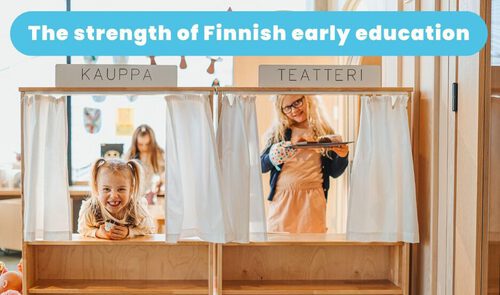
Support your Teachers' Professional Development with Kindiedays Workshops
Do you need new competencies and skills to renew your center? Are you interested to learn from Finnish best practices?
Our preschool professionals provide interactive online workshops to support you and your team. You get specialized knowledge in early childhood education topics, and the opportunity to network with peers and develop professionally.
Join our interactive workshops to explore various aspects of early education

Benefit from best practices from Finland
- Workshops run by ECE specialist
- Live interactive online training 2 hours
- Q&A 30 minutes
- Up to 30 participants
- Certification of attendance
Price 300 Euro per workshop
Choose the workshops that best meets your needs
Click workshop icon to watch video:
The Strength of the Finnish Early Education is a workshop designed to showcase the unique and effective elements of the Finnish education system. Participants will explore the ultimate goals of Finnish education and delve into the EduCare model, which integrates care and education seamlessly.
The workshop will address why a fresh approach to education is essential and identify the key knowledge, skills, and competencies required for thriving in today’s society and workforce. Attendees will gain insights into the daily routines of Finnish kindergartens, the learning areas and the key principles that underpin the Finnish early childhood education and care (ECEC) system. Join us to discover how these innovative practices can transform early education and better support children’s development.
Learning Environment Setup with Inspiration from Finnish Classrooms is a workshop that guides educators in creating inclusive, healthy, and engaging learning environments inspired by the Finnish ECEC model. This workshop will explore how to design spaces that support children's development, curiosity, and well-being, while also fostering social interaction and learning. Participants will learn to incorporate physical, social, and psychological dimensions into their classroom setups, ensuring that every child feels safe, valued, and encouraged to explore.
The workshop will cover key factors in creating effective learning environments, including ergonomics, accessibility, and the use of diverse resources. Educators will also discover how to create learning corners that promote creativity, physical activity, and cultural awareness, all while involving children in the planning process to make the environment truly reflective of their needs and interests.
Linguistic Development Through Playful Learning is a workshop designed to explore the vital role of language in early childhood education. Language is not only an object of learning but also a powerful vehicle for learning, providing children with the means to manage situations, interact with others, express themselves, and acquire knowledge.
Throughout the workshop, participants will learn strategies to support language development, from encouraging speech and interaction to fostering language comprehension and production skills. The importance of playful language activities, such as nursery rhymes, storytelling, and playful writing, will be highlighted as effective tools for expanding children's vocabulary, linguistic memory, and overall communication abilities. By the end of the workshop, participants will be equipped with a variety of experiential and playful approaches to create enriching language-learning environments that promote children's cognitive and social growth.
Phonics is a multi-sensory and systematic approach, which has been shown to significantly improve literacy outcomes. We will guide you through each stage of phonics teaching, from introducing letter sounds to teaching blending for reading and segmenting for writing. We will also explore hands-on activities, games, and exercises that make learning phonics an engaging and interactive experience for children.
By the end of the workshop, you will be equipped with a solid understanding of phonics instruction. Join us to unlock the potential of every child in your classroom and make the journey to literacy an enjoyable and successful one.
Diverse Expression Skills Through Playful Learning" explores the transformative role of Art Education in early childhood. This workshop explores how diverse forms of expression—musical, visual, craft-based, verbal, and physical—can be nurtured through playful and engaging methods. This workshop offers practical skills and innovative ideas to support and nurture these diverse forms of expression through hands-on, experiential activities.
Emphasising the integration of art forms and cultural heritage, it highlights how artistic experiences enhance children's social skills, self-esteem, and cognitive development. The workshop also examines the balance between open-ended and closed-ended art activities, the role of art centres and displays, and the connection between art, language development, and mathematical thinking.
Community Studies Through Playful Learning in Early Years is a workshop designed to explore how young children expand their understanding of the world around them as they enter early childhood education. The focus is on helping children engage with the diversity within their local community and understand the various systems that influence their development, both directly and indirectly.
Participants will learn to approach community studies through ethical thinking, worldviews, and the history and future of the local community. Using interactive methods like fairy tales, music, visual arts, and local visits, the workshop fosters children's cultural competence, social-emotional learning, and understanding of community systems. By the end, participants will be equipped with practical strategies to create learning environments that nurture children's ability to navigate and contribute to their communities while respecting diversity.
Parents as partners in Early Learning is a workshop dedicated to enhancing collaboration between teachers and parents to support children's growth and development. This workshop emphasizes the importance of building trust and fostering mutual respect in educational partnerships.
Participants will explore strategies for involving parents in their child's learning journey, ensuring their active engagement in planning, and evaluating educational activities. The workshop will cover effective communication techniques, strategies for encouraging parental involvement, and ways to overcome common barriers. By highlighting the role of parents in transitions and daily interactions, this workshop aims to strengthen the partnership that is crucial for the holistic well-being of children.
STEM Education Through Playful Learning in Early Years is a workshop designed to equip teachers with strategies to foster children's curiosity and understanding of the world through STEM (Science, Technology, Engineering, and Mathematics). Emphasizing that STEM is both a way of teaching and learning, this workshop highlights how STEM education supports the development of essential 21st-century skills, preparing children for the demands of the modern workforce.
Participants will learn how to nurture children's mathematical thinking, environmental awareness, and technological skills through playful, hands-on activities. The workshop also focuses on guiding children to observe, analyze, and interact with their surroundings, promoting a strong foundation in multiliteracy. By integrating STEM into everyday learning, the workshop aims to nurture children's joy of discovery and problem-solving, setting the stage for lifelong learning and innovation.
Growth and Movement Through Playful Learning in Early Years is a workshop designed to help educators promote children's physical, emotional, and social well-being through engaging activities. This workshop will guide teachers on how to encourage children to be physically active, fostering their growth and development in a fun and interactive way. Participants will learn how to integrate physical activity, food education, and health and safety practices into daily routines, supporting children's overall health and well-being.
The workshop emphasizes the importance of creating diverse opportunities for movement, both indoors and outdoors, to help children develop essential motor skills and a positive attitude toward physical activity. Additionally, it will cover strategies for promoting healthy eating habits and teaching children about body awareness, hygiene, and safety, ensuring a holistic approach to early childhood education.
Planning, Documentation, and Assessment of Playful Learning is a workshop aimed at equipping educators with effective strategies for early childhood education. This session will explore how to plan activities that align with children's interests and developmental needs, using a holistic and child-centered approach. Participants will learn the significance of systematic documentation in capturing and understanding children's growth and interactions.
The workshop will cover how to use this documentation to inform planning and enhance the learning environment. Educators will gain insights into creating engaging, responsive spaces that support children's well-being and development.
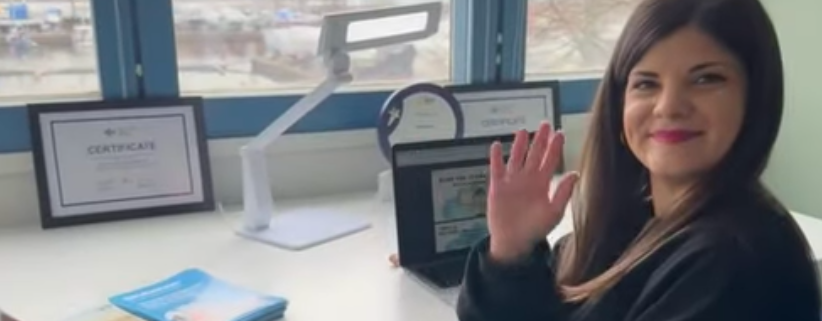

1. The strength of the Finnish early education
A workshop designed to showcase the unique and effective elements of the Finnish education system. Participants will explore the ultimate goals of Finnish education and delve into the EduCare model, which integrates care and education seamlessly.
The workshop will address why a fresh approach to education is essential and identify the key knowledge, skills, and competencies required for thriving in today’s society and workforce. Attendees will gain insights into the daily routines of Finnish kindergartens, the learning areas, and the key principles that underpin the Finnish early childhood education and care (ECEC) system. Join us to discover how these innovative practices can transform early education and better support children’s development.
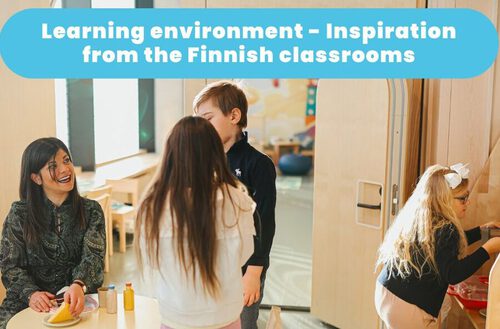
2. Learning environment setup: inspiration from Finnish classrooms
This is a workshop that guides educators in creating inclusive, healthy, and engaging learning environments inspired by the Finnish ECEC model. It will explore how to design spaces that support children's development, curiosity, and well-being while fostering social interaction and learning. Participants will learn to incorporate physical, social, and psychological dimensions into their classroom setups, ensuring every child feels safe, valued, and encouraged to explore.
The workshop will cover key factors in creating effective learning environments, including ergonomics, accessibility, and the use of diverse resources. Educators will also discover how to create learning corners that promote creativity, physical activity, and cultural awareness, all while involving children in the planning process to make the environment truly reflective of their needs and interests.
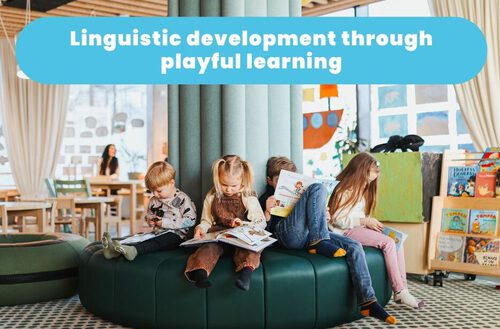
3. Linguistic development through playful learning
A workshop designed to explore the vital role of language in early childhood education. Language is an object of learning and a powerful vehicle for learning, providing children with the means to manage situations, interact with others, express themselves, and acquire knowledge.
Throughout the workshop, participants will learn strategies to support language development, from encouraging speech and interaction to fostering language comprehension and production skills. The importance of playful language activities, such as nursery rhymes, storytelling, and playful writing, will be highlighted as practical tools for expanding children's vocabulary, linguistic memory, and communication abilities. By the end of the workshop, participants will be equipped with various experiential and playful approaches to create enriching language-learning environments that promote children's cognitive and social growth.

4. Phonics
Phonics is a multisensory and systematic approach that has significantly improved literacy outcomes. We will guide you through each stage of phonics teaching, from introducing letter sounds to teaching blending for reading and segmenting for writing. We will also explore hands-on activities, games, and exercises that make learning phonics an engaging and interactive experience for children.
By the end of the workshop, you will be equipped with a solid understanding of phonics instruction. Join us to unlock the potential of every child in your classroom and make the journey to literacy an enjoyable and successful one.
.
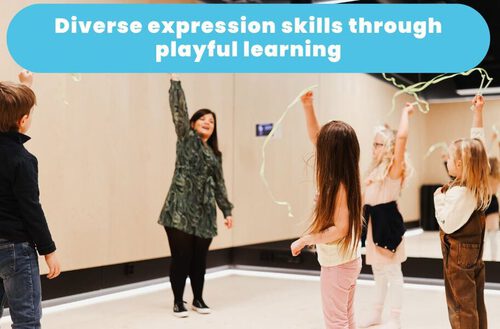
5. Diverse expression skills through playful learning
Diverse Expression Skills Through Playful Learning" explores the transformative role of Art Education in early childhood. This workshop explores how diverse forms of expression—musical, visual, craft-based, verbal, and physical—can be nurtured through playful and engaging methods. It offers practical skills and innovative ideas to support and nurture these diverse forms of expression through hands-on, experiential activities.
Emphasizing integrating art forms and cultural heritage, it highlights how artistic experiences enhance children's social skills, self-esteem, and cognitive development. The workshop also examines the balance between open-ended and closed-ended art activities, the role of art centers and displays, and the connection between art, language development, and mathematical thinking.
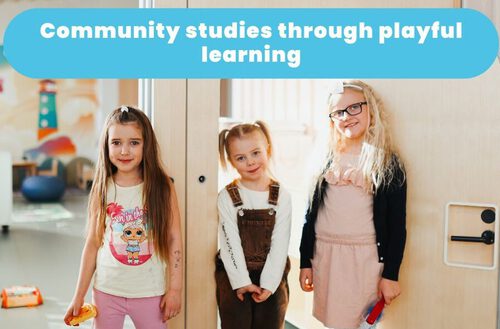
6. Community studies through playful learning in early years
This workshop explores how young children expand their understanding of the world around them as they enter early childhood education. The focus is on helping children engage with the diversity within their local community and understand the various systems that influence their development, both directly and indirectly.
Participants will learn to approach community studies through ethical thinking, worldviews, and the history and future of the local community. The workshop fosters children's cultural competence, social-emotional learning, and understanding of community systems through interactive methods like fairy tales, music, visual arts, and local visits. By the end, participants will be equipped with practical strategies to create learning environments that nurture children's ability to navigate and contribute to their communities while respecting diversity.
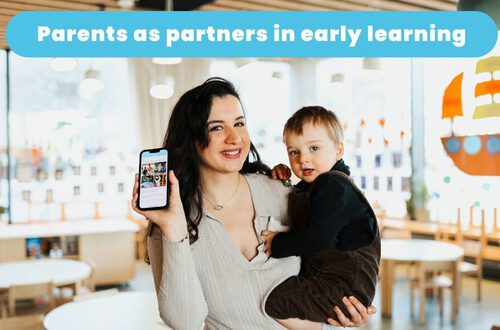
7. Parents as Partners in early learning
This workshop is dedicated to enhancing collaboration between educators and parents to support children's growth and development. It emphasizes the importance of building trust and fostering mutual respect in educational partnerships.
Participants will explore strategies for involving parents in their child's learning journey, ensuring their active engagement in planning, and evaluating educational activities. The workshop will cover effective communication techniques, strategies for encouraging parental involvement, and ways to overcome common barriers. By highlighting the role of parents in transitions and daily interactions, this workshop aims to strengthen the partnership crucial for children's holistic well-being.
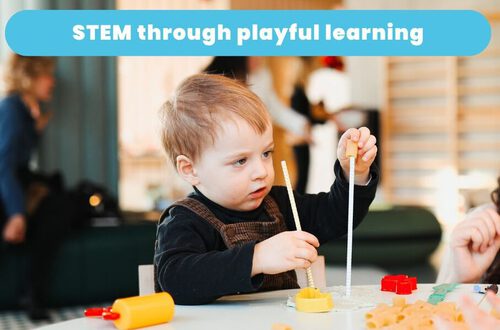
8. STEM through playful learning in early years
This workshop is designed to equip teachers with strategies to foster children's curiosity and understanding of the world through STEM (Science, Technology, Engineering, and Mathematics). Emphasizing that STEM is both a way of teaching and learning, this workshop highlights how STEM education supports the development of essential 21st-century skills, preparing children for the demands of the modern workforce.
Through playful, hands-on activities, participants will learn how to nurture children's mathematical thinking, environmental awareness, and technological skills. The workshop also focuses on guiding children to observe, analyze, and interact with their surroundings, promoting a solid foundation in multiliteracy. Integrating STEM into everyday learning, the workshop aims to nurture children's joy of discovery and problem-solving, setting the stage for lifelong learning and innovation.
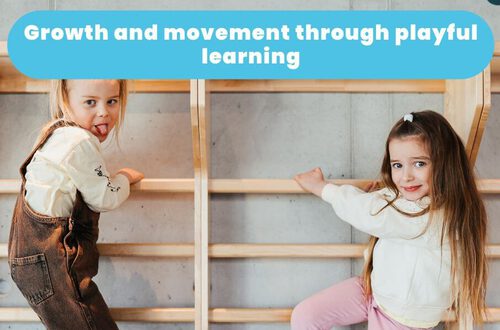
9. Growth and movement through playful learning in early years
This workshop is designed to help educators promote children's physical, emotional, and social well-being through engaging activities. It will guide teachers in encouraging children to be physically active, fostering their growth and development in a fun and interactive way. Participants will learn to integrate physical activity, food education, and health and safety practices into daily routines, supporting children's overall health and well-being.
The workshop emphasizes the importance of creating diverse opportunities for movement, both indoors and outdoors, to help children develop essential motor skills and a positive attitude toward physical activity. Additionally, it will cover strategies for promoting healthy eating habits and teaching children about body awareness, hygiene, and safety, ensuring a holistic approach to early childhood education.
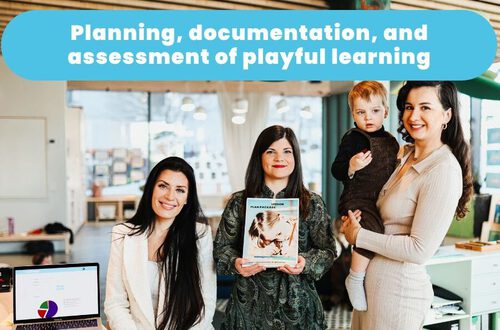
10. Planning, documentation, and assessment of playful learning
This workshop aims at equipping educators with effective strategies for early childhood education. This session will explore how to plan activities that align with children's interests and developmental needs using a holistic and child-centered approach. Participants will learn the significance of systematic documentation in capturing and understanding children's growth and interactions.
The workshop will cover how to use this documentation to inform planning and enhance the learning environment. Educators will gain insights into creating engaging, responsive spaces that support children's well-being and development.


